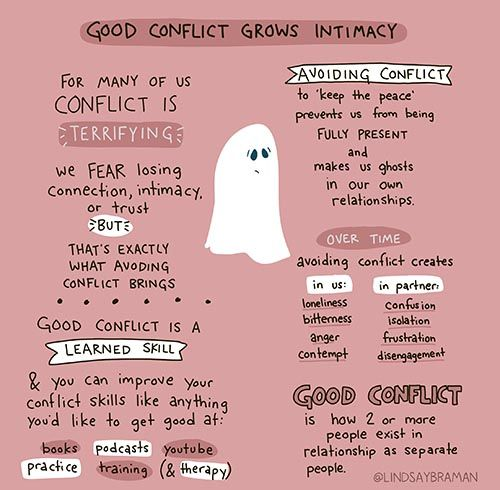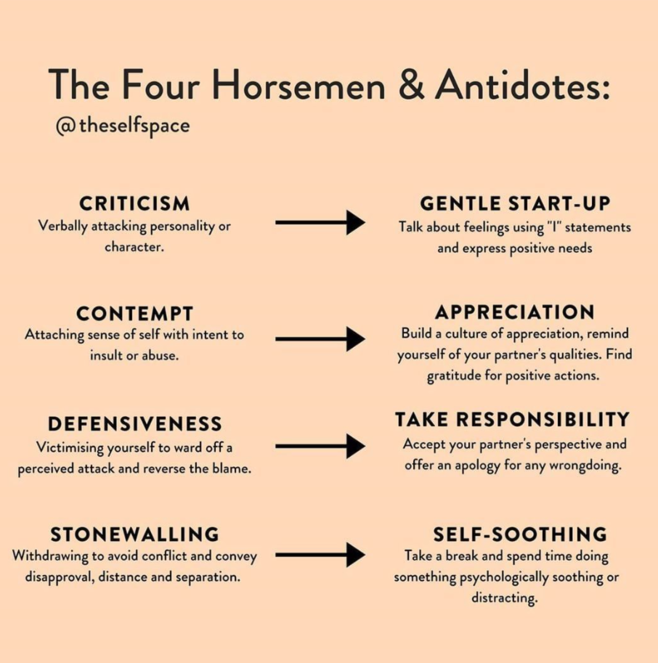How to deal with relationship conflicts?

Relationships are one of the most important parts of life because they bring joy, connection, and purpose to us. As humans, we are social creatures. We thrive when we share our lives and live amongst each other.
Just as relationships can bring us purpose and joy, they can also be a huge source of hurt, disappointment, and trauma. Adults that did not experience positive, healthy relationships as a child can have tendencies to isolate, be defensive, and may even have issues with emotional outbursts when they feel unsafe.
A common issue when people feel unsafe is reoccurring conflicts
Have you ever been in a situation where no matter how much you try to explain, compromise, and listen – you just can’t seem to stop fighting with someone?
You might be asking – “why are they so stubborn?” or “why can’t they see my point of view?”
Constantly fighting with someone you love can make you feel like this person doesn’t really love or care for you. Being in a relationship with them – whether as a parent, friend, or partner – can make you doubt and question yourself and become a constant source of anxiety and fear.
If you are always butting heads with someone, it might be time to take a step back and analyze what really is going on.
At its core, conflict can simply be a sign of miscommunication, a mismatch of goals, and a lack of self-awareness.
While relationships are complicated and complex, Fred Sudfeld, a mental health therapist supervisor at The Family Centre, says that there are steps to understanding conflict. These guidelines can help you figure out what is holding your relationship back from thriving.
Steps to understanding conflict
- The first step is to understand that conflict is normal. Just as relationships are an inevitable part of life, conflict is too. However, keep in mind that the attitude and skills you use to communicate matter, a lot. When discussing topics, having good communication, active listening skills, and using soft starts are key.

2. Secondly, the way you describe your conflict is important.
Fred says that defining the conversations helps us understand whether you are actually fighting, or just disagreeing with each other. There will always be a difference in opinion in relationships. Understanding your type of conflict helps you understand and approach it better.
He breaks them down into four categories:
- A fight generally means a discussion that has turned ugly. Shaming, belittling, criticizing, and guilting are usually involved. This type of conflict is most likely to reoccur because cheap shots are taken and feelings are hurt, causing both people to disrespect each other.
- An argument means: “boy, do we really have a difference in opinion.”
- A disagreement is when both parties can’t agree on something. If this is not resolved in a healthy manner, it can turn into a fight.
- A discussion is when two people are able to talk openly and fairly about a topic. This is the healthiest type of communication in relationships.
If you recognize that you are always fighting with someone, then The Four Horseman by Dr. John Gottman is something to take a deeper look at.
The Four Horseman is Gottman’s theory on negative communication patterns that, if continues to reoccur, can lead to the end of your relationships. Here’s a brief rundown.
The First Horseman: Criticism
Criticism is an attack on someone’s core character. It is usually confused with complaining. An easy way to understand the difference between the two is that complaining is about a specific topic, whereas criticism is attacking the person. Take a look at the examples below:
- Complaint: “I was scared when you were running late and didn’t call me. I thought we had agreed that we would do that for each other.”
- Criticism: “You never think about how your behavior is affecting other people. I don’t believe you are that forgetful, you’re just selfish. You never think of others! You never think of me!”
If someone is attacked constantly, it can lead them to feel hurt and rejected, which can lead to contempt.
The Second Horseman: Contempt
Contempt is when we treat others with disrespect, mock them with sarcasm, name call, or use body language like eye-rolling or scoffing to show despise.
When contempt happens, you are not only attacking their character, but showing them that you are superior. Take a look at the example below:
“You’re ‘tired?’ Cry me a river. I’ve been with the kids all day, running around like mad to keep this house going and all you do when you come home from work is flop down on that sofa like a child and play those idiotic video games. I don’t have time to deal with another kid. Could you be any more pathetic?”
Contempt is usually a sign that someone has had long-running negative thoughts about the other person, to the point where they feel like they are more righteous than the other.
The Third Horseman: Defensiveness
Let’s be honest – we all get defensive from time to time. But when we use it as our main excuse to not take responsibility for something, it can sour the relationship because it tells the other person that we don’t take our mistakes seriously.
- Question: “Did you call Betty and Ralph to let them know that we’re not coming tonight as you promised this morning?”
- Defensive response: “I was just too darn busy today. As a matter of fact, you know just how busy my schedule was. Why didn’t you just do it?
- Non-defensive response: “Oops, I forgot. I should have asked you this morning to do it because I knew my day would be packed. That’s my fault. Let me call them right now.”
Defensiveness can also come off as blaming the other person by twisting the conversation to make it their fault. While it’s understandable to want to be defensive, it’s usually not a smart move when someone is upset.
Defensiveness can come from feeling low about yourself. If you are lacking healthy self-esteem, this class can help: Self-Improvement Workshop: Self-Esteem Course
The Fourth Horseman: Stonewalling
When we shut down, isolate, and stop responding during conversations, this is stonewalling. Instead of trying to work out the issues, the listener starts acting distracted, busy, or turning away to avoid the conversation.
Stonewalling is a result of feeling emotionally-flooded, which means having a lower emotional capacity to handle the situation at that moment.
The best way to conquer stonewalling is to take a breather by asking for a break. 20 minutes will usually do the trick. Here’s an example of a healthy way to ask:
“Alright, I’m feeling too angry to keep talking about this. Can we please take a break and come back to it in a bit? It’ll be easier to work through this after I’ve calmed down.”
Do calming activities like taking a walk, meditating, or talking to a friend. When you’re ready, come back to the conversation.
Watch this short video on The Four Horseman:
If you recognize these communication patterns in your relationship and want change – good news! This is a skill that can be improved. The key is to be aware and actively practice positive behaviors.

If you’re ready to improve these negative communication styles, our workshop on effective communication skills may help: Self Improvement Workshop: Effective Communication Skills
The Importance of Active Listening
Active Listening is one of the most important aspects of communication. You may have heard the term thrown around these days.
What is Active Listening? It is listening to truly understand the other person by stepping into their shoes. Many people listen only to respond – they don’t actively try to see the other’s point of view because they are too busy thinking about themselves.
When we put down our egos to actually listen and understand each other, we are allowing ourselves to see the other person at their core. Other than making the other person feel seen, it can help them feel respected and empower a deeper connection.
A Note on Anger
Do you feel like sometimes you are so heated, you only see red?
Emotions play a big part in conflict resolution. As humans, we all go through good and bad days. We have daily issues that can affect our mood and unique perspectives with how we deal with things. If we are unable to handle our emotions in a healthy way, this can cause us to project them on others.
If you feel like emotional regulation is tough for you, our Anger Management classes can teach you how to address it in a healthy way:
Healthy and conflict-free relationships are within your reach! If you are ready to work on your self-awareness and communication skills, The Family Centre is here to support you.
Here are other relationship-related articles for you.
exclusively written for familycentre.org
by Jessica Tran
